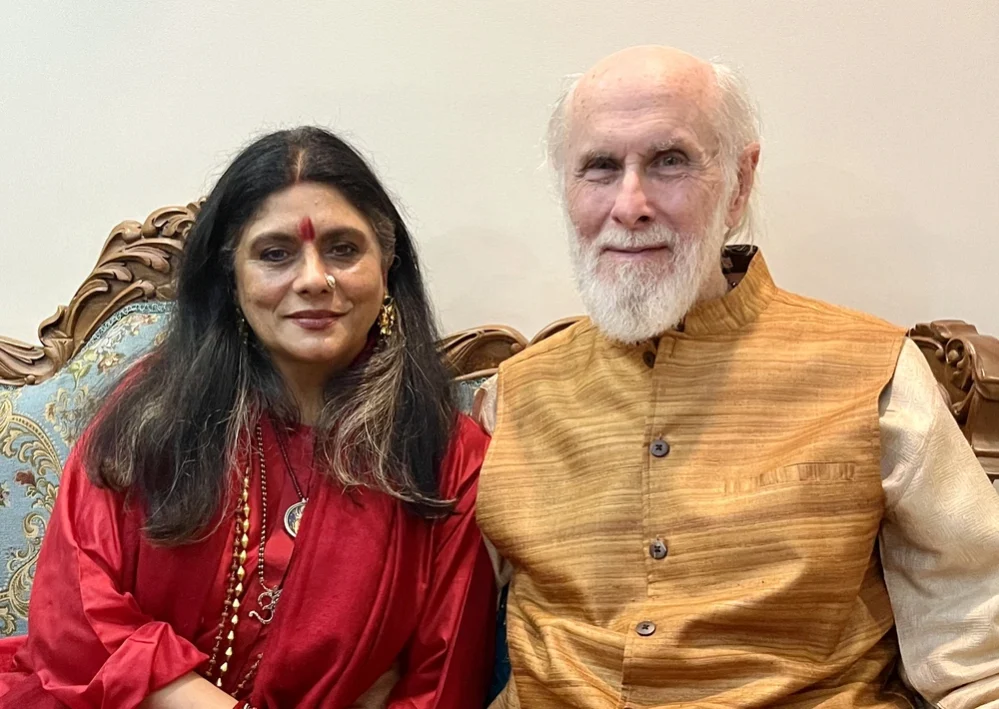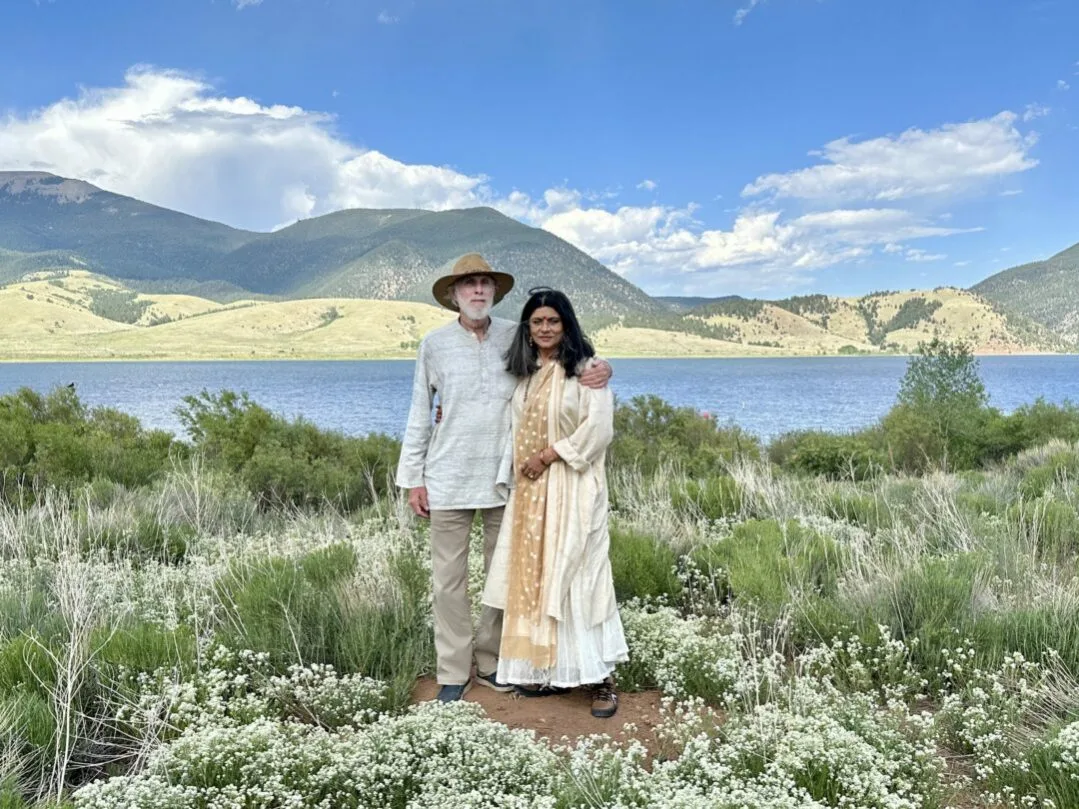Founded and directed by Dr David Frawley D. Litt., (Pandit Vamadeva Shastri), the Vedic Institute serves as a vehicle for his work, offering online access to go with his many published writings.
The institute works with associated organizations throughout the world. It encourages a deeper study of the Vedic teachings in all forms and branches and is interdisciplinary in approach, including its connections with Hinduism/Sanatana Dharma in a contemporary context in harmony with nature and the living universe.
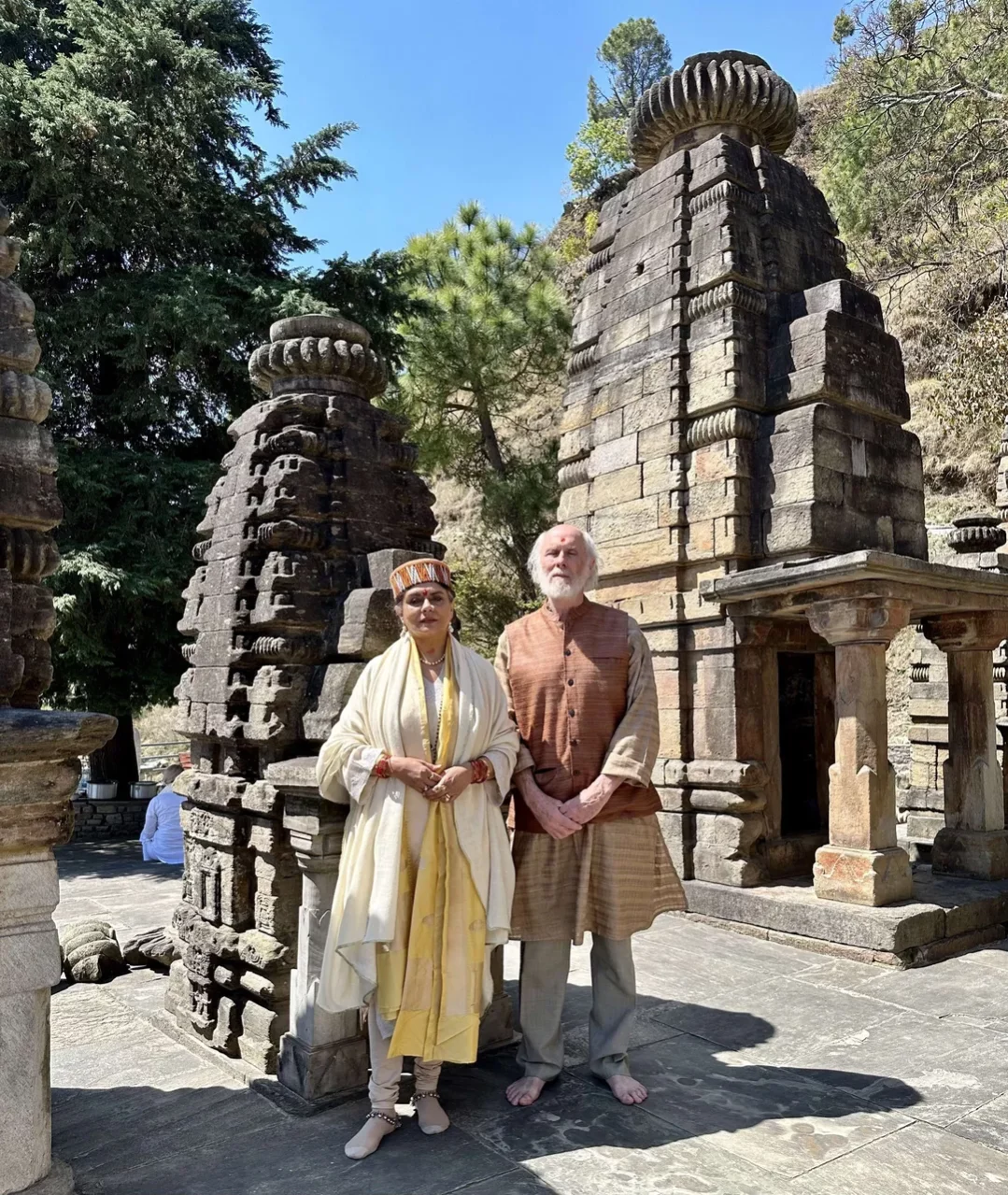
Dr. Frawley receiving the Padma Bhushan Award from President of India Pranab Mukherji in 2017 at Rashtrapati Bhavan.
DR DAVID FRAWLEY founded the ‘Vedic Research Center’ in 1980 for his work on the Vedas since 1970 and his writings for Indian publications since 1977. His early work focused on the Vedas and their yogic relevance for the Sri Aurobindo Ashram, Ramanashram and Sri Sri Anandamayi Ma. It included extensive translations from Vedic texts, notably Rigveda. In 1988, Vamadeva expanded the center into the “American Institute of Vedic Studies” to promote Yoga, Vedanta, Ayurveda and Vedic Astrology as Vedic knowledge systems, related to his research and publications.
YOGINI SHAMBHAVI joined Vamadeva twenty years ago as his wife and co-teacher. She offers consultations, Yoga Shakti retreats, training programs and personal guidance, notably in the field of Shakti Sadhana, and has her own approach to higher consciousness. Yogini Shambhavi is one of the most important women gurus coming out of India today and holds many sacred traditions of the Himalayas. You can contact Yogini Shambhavi relative to her Vedic Astrology Consultations. Yogini Shambhavi leads our Yoga and Ayurveda Retreats that we are associated with in India and many other countries in the world.
Audio Introduction to our Work by Vamadeva
As our work is publication and web-based, you can easily connect with us through the internet, including four in depth on-line courses relative to Ayurvedic Healing, Ayurvedic Astrology, Yoga, Ayurveda, Mantra and Meditation and Integral Vedic Counseling. Each course consists of extensive course lessons, enhanced by illustrations, audios and videos.
Ayurveda – we teach the foundation of Ayurveda for wellness, right living, and countering common diseases and afflictions of body and mind. Our specific focus is on Ayurveda and Yoga psychology as addressing the complications of our high tech society, including the yogic aspects of Ayurveda, making Ayurveda relevant to all.
Yoga – we teach Raja Yoga, the approach of the Upanishads, Bhagavad Gita and Yoga Sutras, with reference to Vedanta or the Yoga of knowledge (Jnana Yoga), and an emphasis on Yoga psychology and the science of consciousness. In addition we teach the spiritual Tantric Yoga of mantras, deities, working with the subtle body, chakras, Kundalini and Shiva/Shakti energies. In this regard we integrate Yoga and Ayurveda.
Vedic astrology, Jyotish – we emphasize the astrology of healing, Vedic medical or Ayurvedic astrology, yogic astrology, mantras and deities relative to astrological remedial measures. We offer astrological consultations and teachings.
Vedic counseling – we emphasize an integral approach combining Vedic knowledge systems of Ayurveda, Yoga, Vedanta and Vedic astrology, along with teaching the foundation of Vedic dharmic living and karmic life-management. We have been developing this new field in recent years to bring together the different aspects of our course.
Vedic studies, ancient India and ancient history – We look back to ancient Vedic Rishi traditions going back to the dawn of history, as in the Vedic view we are but the seventh of fourteen humanities, not the first, the highest or the last. We research ancient traditions worldwide and connected to lokas or realms beyond the physical. In this regard, we honor all ancient, mystic, indigenous an native traditions.
Contact Information: Best way to contact us is by email. We do not offer phone contact without prior email communication.
American Institute of Vedic Studies
PO Box 8357, Santa Fe NM 87504, USA
Email: [email protected]
We do not have an on-site center or classes open to the public. We do not operate any clinic or store for people to visit, receive treatments or buy products. Our work is online and by special programs and conferences. We are not a public institution but a private research center.
Yet you don’t have to take our courses in order to benefit from our extensive website and its many offerings. We have over two hundred articles in our articles section that you can access from our website on all aspects of Vedic, Yogic and Ayurvedic knowledge, including its contemporary relevance, challenges and global approach.
We have several special areas of emphasis:
 Our Main Gurus and Their Teachings, by Vamadeva
Our Main Gurus and Their Teachings, by VamadevaOur teachings are rooted in those of the gurus we have followed over the last fifty years. We share that basic information here, with the key teachers involved.
Our main influence since 1970 has been the teachings of Bhagavan Ramana Maharshi and the tradition of Advaita Vedanta that he was connected to going back to Adi Shankara and the Upanishads. We visited the ashram many times over the years, wrote a number of articles for their Mountain Path publication, and spoke before their centers in India and the West, studying and practicing Bhagavan’s teachings as the basis of our sadhana. Most importantly we received Ramana’s presence and teaching into our lives at various visions and experiences at the ashram, the Tiruvannamalai temple, and the Arunachala mountain.
Yet our connection with Ramana developed another special dimension to it. We came into contact with the teachings of Kavyakantha Ganapati Muni (1878-1936), perhaps the chief disciple of Ramana, through K. Natesan, one of his oldest living disciples. Ganapati was probably the greatest Sanskrit writer of modern India and a Raja Yogi of the highest order, for whom all the secrets of Kundalini and the chakras, as well as the depths of Advaita, were on the tip of his tongue expressed through his mantric powers. His teachings have greatly influenced us.
K. Natesan (1912-2009) had been with Ramana since the age of 12 and with Ganapati since the age of 18, with regular contact with both. He received a special mission to preserve through Ramana and Ganapati to carry on Ganapati’s works, from his Sanskrit renderings of Ramana’s teachings to his vast studies that included Yoga, Vedanta, Ayurveda and Jyotish, revealing the secrets of the Vedas along with Shakti Sadhana and a new vision of India and humanity. Since first meeting him in 1991 to the time of his passing, I shared these teachings and took them up, as they resonated with my own ongoing sadhana and teachings that already included Yoga, Vedanta, Ayurveda, Jyotish and Vedas, with views similar to Ganapati.

From 1976-1982 I was blessed to be in correspondence with Sri Sri Anandamayi Ma (1896-1982), the bliss-permeated Mother, perhaps modern India’s most honored woman guru, through her disciples Swamis Atmananda and Nirvananda. Ramana was my spiritual father and Anandamayi Ma was my mother. Ma inspired me inwardly and encouraged my Vedic research, Yoga and Vedantic contemplations. Her continued communication aided in my confidence in approaching such profound teachings from distant India. She said I should never doubt my path or my work in the Vedic field and that she would always be with me, but have full confidence in my spiritual work.
Since discovering his teachings in 1970, Sri Aurobindo has remained a primary influence in our work. In 1979 I met Sri MP Pandit (1919-1994), then Secretary of the Sri Aurobindo Ashram in India, who began publishing my Vedic research in various ashram publications and books in India in 1980-1986, including many translations from the Rigveda and Yajurveda, who encouraged my writings overall and my Vedic mission. Besides connecting me with the influence of Sri Aurobindo, he brought the teachings of the Mother at the Sri Aurobindo Ashram, more strongly into my life and awareness.
Aurobindo’s vision of the Secret of the Vedas and the need for a new evolution of consciousness in humanity have marked my thought as well, including an integral approach to Yoga and all life as Yoga. I have been part of the International Advisory Committee (IAC) for the city of Auroville.
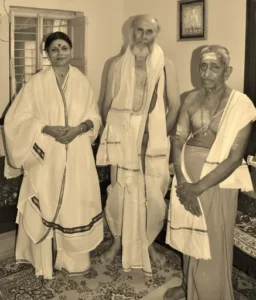
I met Sadguru Sivananda Murty first in Hyderabad in 1994 and remained in close contact with him until his Mahasamadhi in 2015. Guruji was the head of the Saiva Mahapeetham, a Shaivite order from Andhra Pradesh, which we joined. He was connected to Ramana Maharshi but also to Trailanga Swami, and many important gurus and teachings of South India of an esoteric nature.
Besides Raja Yoga and Advaita Vedanta, he was adept in Jyotish, Mantra and knew the essence of Telegu culture and music, aiding in the renovation of temples. He visited the West several times and we visited him regularly at his Gurudham in Warangal and his Ashram near Vishakhapatnam. Guruji was most unassuming and accessible outwardly but held tremendous power and insight, holding many of the deeper teachings of Bharat.
Yogini Shambhavi hadsa special rapport with Guruji and he continues to guide her from within. He empowered her to teach others and be a guru in her own right.
The background and philosophy of the American Institute of Vedic Studies can be understood by the following presentations of Vedic Knowledge Systems, their Yogic applications, and Hindu (Sanatana) Dharma.
As representing Vedic Studies, we would like to share with you our view of Vedic knowledge.
Vedic Knowledge
The Vedas are a vast set of spiritual teachings dating from the dawn of history. They consist of the mantras of numerous great Himalayan yogis and seers, who were said to have founded the spiritual paths for humanity at the beginning of this world-age ten thousand years ago. The Vedas are the origin of Hindu Dharma and have influenced religions and philosophies all over the world. The Vedas contain the basis for the spiritual traditions of India that arose in the Himalayan region, including those of Yoga, Vedanta, Puranas, Tantra, Ayurveda and Vedic astrology. The Vedas also contain keys to the pagan traditions of all Indo-European peoples – the Greeks, Romans, Celts, Germans and Slavs – whose ancient languages and cultures resemble the Vedic. The Vedas reflect the ancient solar religions and enlightenment traditions that once dominated the world from Mexico to China.
As such, the Vedas represent the ancient global spiritual culture and yogic approach to life behind our deepest spiritual heritage as a species. The Vedas are centered in the deepest yogic and Self-knowledge – the unity of the individual reincarnating soul (Jiva) with the Divine. They teach us that there is only One Self (Atman, Purusha) in the universe, in which is bliss and liberation from the cycle of karma and rebirth. Vedic knowledge expands from this central point to help us understand the meaning of our existence on all levels including the physical body and the world of nature.
The Vedas notably present the mantric key behind the entire process of cosmogenesis, but this key is cryptic and requires special insight and instruction in order to access it. Vedic science is an integral spiritual science, which can bring about a truly harmonious global civilization. It provides both knowledge of our True Self and the Conscious universe, revealing all the secrets of nature and its laws.
The Four Vedas
The Upanishads and Bhagavad Gita
The Upanishads are clearest and most understandable portion of the mysterious Vedas. They present the spiritual secret of the Vedas, the knowledge of the Supreme Self or Divine I-am. They contain many yogic secrets as well. The Bhagavad Gita teaches the essence of the Upanishads, the great teaching of Vedanta, through the figure of Sri Krishna, the Yogavatara or avatar of Yoga.
Vedangas and Vedic Astrology
There are six limbs of the Vedas of which the most important is Jyotish or Astrology. The others are Chhandas (Meter), Nirukta (Etymology), Shiksha (Pronunciation), Vyakarana (Grammar), and Kalpa (Ritual). Most of these deal with sound and mantra. Vedic astrology unfolds the science of time and karma, making it essential for our right living individually and collectively. Our Vedic birth chart shows our karmic DNA, the subtle patterns of our karmas and their likely manifestation through time, so we can manage it in the optimal manner. We teach Vedic astrology in harmony with Yoga, Vedanta and Ayurveda.
Upavedas and Ayurveda
There are four Upavedas or Secondary Vedas of which the most important is Ayurveda or Vedic healing/medicine. The others are Dhanur Veda (martial arts), Sthapatya Veda (Architecture) and Gandharva Veda (Music). Ayurveda is not just a medical system but shows us how to find complete well-being and harmony in terms of body, mind and consciousness, covering our entire nature physical, psychological and spiritual. Knowing our individual Ayurvedic constitution and the appropriate life-style for it we can maximize all our life potentials. We teach Ayurveda for body, mind and consciousness, aligned with Yoga, Vedanta and Vedic astrology.
Yoga in the deeper sense
Yoga in the traditional sense is the practice of Vedic knowledge that develops our inner faculties through meditation, leading us to Self-realization. There are many forms of Yoga as Karma (action) Bhakti (devotion), Jnana (knowledge), Raja (meditation), Hatha (working with Prana). They are based on traditions found in the Mahabharata, Puranas, Upanishads and Vedas. Patanjali Raja Yoga is an integral science of asana, pranayama, mantra and meditation based upon dharmic living principles. Its popular physical side in the West today is only its outer aspect. We follow the Yoga line of Kavyakantha Ganapati Muni, the chief disciple of Bhagavan Ramana Maharshi, which is mainly a form or Raja Yoga.
Vedanta
Vedanta is the practical philosophy of Self-realization that arises from the Upanishads and systematizes their teachings. Its Advaita or non-dualistic form, such as found in the works of Shankaracharya, teaches the unity of the soul (Jiva) and the Creator (Ishvara) in the Supreme Self (Paramatman) or Absolute (Brahman) beyond time, space and karma. Devotional philosophies of Vedanta, like those of Ramanuja, Madhva and Chaitanya, emphasize the Divine as the Supreme Person (Purushottama). We follow the Advaitic line of Shankara to Bhagavan Ramana Maharshi and the Yoga of Knowledge (Jnana Yoga).
Itihasa-Purana
These are encyclopedias of sacred knowledge and stories, covering all aspects of life and culture. There are about twenty Puranas and two Itihasas, the Mahabharata and Ramayana, the stories of Krishna and Rama. Yoga, Vedanta, Ayurveda and Jyotish are common topics in them, explained in detail. The Puranas are probably the most extensive and profound yet neglected spiritual literature coming out of India.
Tantra
Tantra is a profound yogic path of ritual, mantra, and meditation. It centers on the devotional worship of Lord Shiva and the Goddess or Divine Mother. Traditional Tantra is concerned with the integration of male and female energies in the psyche through internal yogic practices. The sexual Tantra popular in the West is only the lower side of this greater system.
Tantric insights and practices are important in Yoga, Ayurveda and Vedic astrology. The worship of the Ten Great Wisdom Forms of the Goddess (Dasha Mahavidya) is one of the key Tantric practices, as is the Sri Vidya or knowledge of Sri Yantra. We follow the Tantric Yoga approach of Kavyakantha Ganapati Muni, chief disciple of Bhagavan Ramana Maharshi, which Yogini Shambhavi teaches for us.
Unlock Ancient Wisdom
Important Pages
join our mailing list to learn about new events, articles and courses
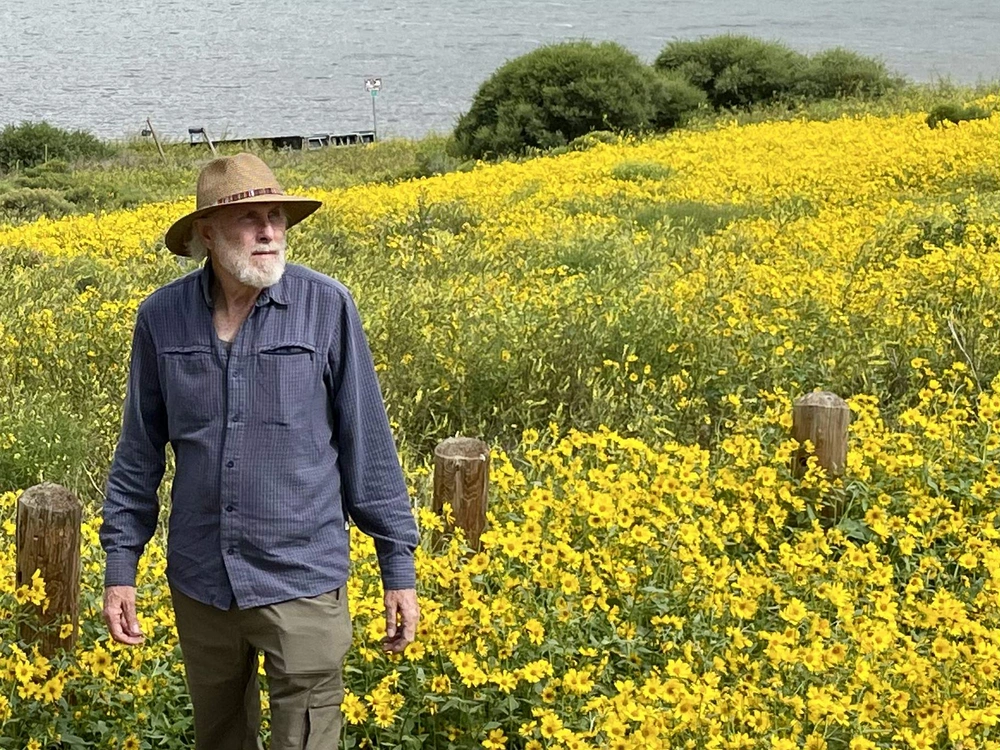
Live Webinar with Dr. David Frawley

WITH DR. DAVID FRAWLEY
